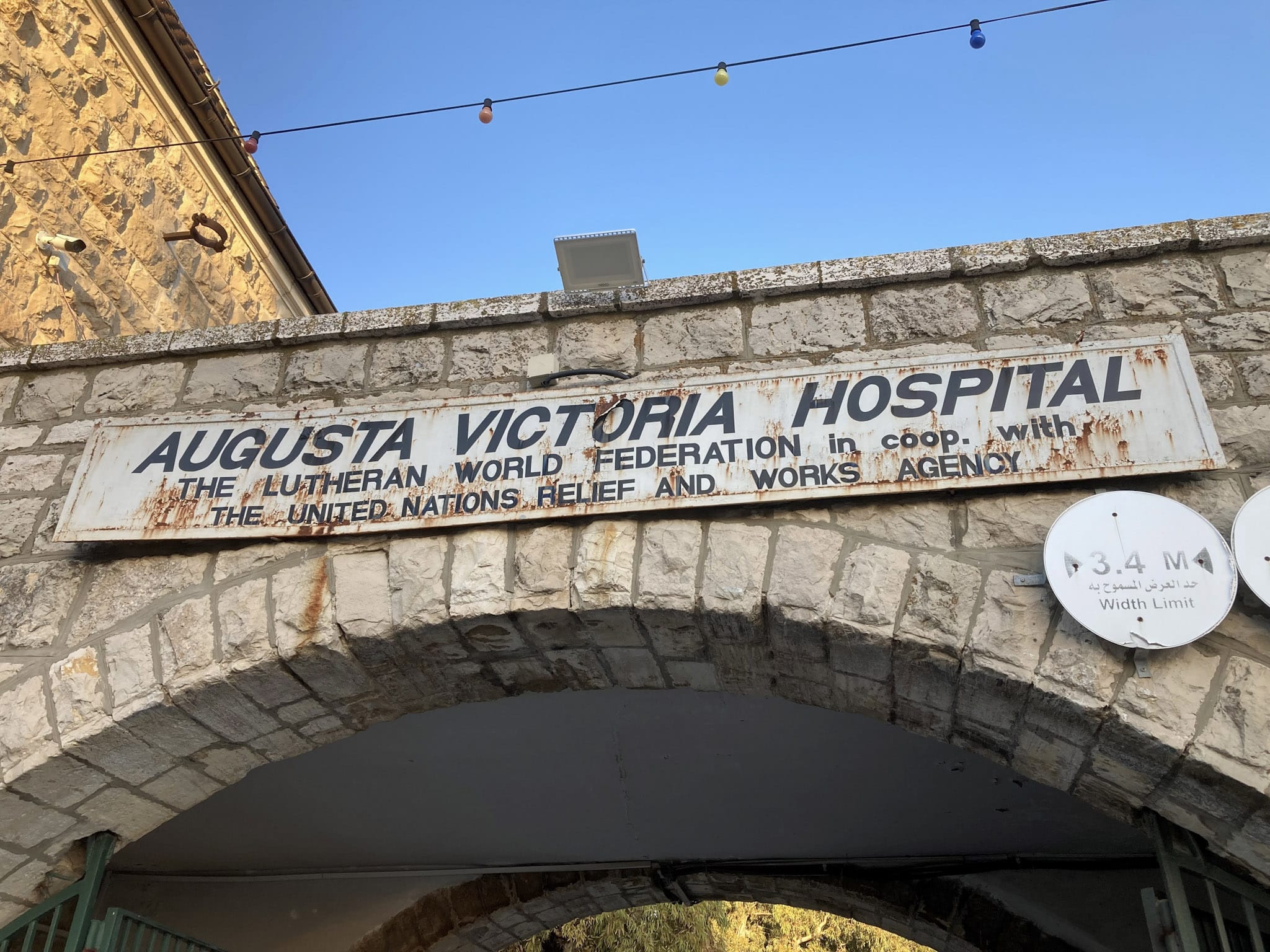‘I left home barefoot and could only pack a small handbag…We walked for about five hours as I was walking slowly, feeling very tired after taking my chemotherapy dose. I knew that I was inching towards death.’
Testimony of Sa’dyia Ibrahim Mahmoud Abu, a Gaza cancer patient forced to evacuate her home before completing treatment
Augusta Victoria Hospital (AVH) is the second largest of six East Jerusalem Hospital Network specialist hospitals. Operated by the Lutheran World Federation, it had served the healthcare needs of the Palestinian community since the Nakba (‘catastrophe’) of 1948, when more than 700,000 Palestinians became refugees following the Arab-Israeli War of that year.
Sited atop the Mount of Olives, the AVH is now a centre of excellence in several crucial medical disciplines, including kidney dialysis, specialist nursing, and long-term care. It is also the only hospital offering comprehensive cancer care to the Palestinians of the occupied West Bank, East Jerusalem, and Gaza.

However, the war that Israel has waged in Gaza in response to Hamas attacks on 7 October 2023, has forced changes on the AVH. No cancer sufferers have been able to travel from Gaza for treatment; patients still arrive from the West Bank, but in fewer numbers because of tightened travel restrictions; and Palestinian staff members commuting in from the West Bank find it harder and harder to get to work. Three (a doctor, a nurse, and a social worker) have recently had their travel documents withdrawn because of their social media usage.
In March 2024, ninety-seven Gaza residents remain in the AVH care. Some are patients. Some are patients’ companions who travelled before October 2023 and have spent the winter in East Jerusalem unexpectedly, without any possibility of returning home. One such patient is a six-year-old boy: his mother is with him, but she has not seen her baby since she arrived here. The baby is being looked after by the mother’s sister, who remains in Gaza.
Within six weeks of the beginning of the war, three Gazan cancer patients (two men, one woman) died while receiving treatment at AVH – the last of the three deaths occurring on 12 November 2023. As Palestinian residents of Gaza, the three deceased patients could not be buried in East Jerusalem, where they died. Their remains were transferred to Ramallah. No family members were able to accompany them.
Two days later AVH were informed by COGAT (the Israeli office responsible for issuing travel permits) that the companions of the deceased patients (two women and one man) would not be permitted to remain in Jerusalem but would have to be transferred to the Palestinian city of Ramallah, in the West Bank.
As the hospital was preparing to arrange the transfer a further message was received. The companions would be returned to Gaza – which was then in its sixth week of war. An AVH vehicle drove the three to Jericho, where they were given into Israeli custody. The Palestinian Authority, acting on Israeli orders, removed their and their deceased relatives’ personal effects (except for cash). They were placed in a van, handcuffed, blindfolded, and secured in leg restraints.
The journey from Jericho to Gaza takes no more than ninety minutes. But the three were held in the van overnight and the following day were released at Kerem Shalom, a crossing point between Israel and Gaza. Hospital staff have been told that all three reached their homes but have received no further news. It is not known whether they are still alive. Gisha, an Israeli human rights organisation, reports that;
‘Nowhere in Gaza is safe…Civilians must be protected, wherever they are.’
The treatment of the Gazan patients’ companions is a glimpse of the healthcare and humanitarian catastrophe that has engulfed the Palestinian people since 7 October 2023. Medical Aid for Palestinians reports that more than 340 healthcare workers have been killed and 270 detained. 155 primary healthcare centres have been damaged, and 126 ambulances have been rendered non-operational. At least 500,000 cases of infectious disease have been recorded. After a two-week-long invasion and siege, the Israeli military withdrew from Gaza’s largest hospital, Al-Shifa Hospital on 1 April, leaving it in ruins and completely out of service. The hospital’s main surgery building, its intensive care unit, and emergency, general surgery, and orthopaedic departments have all been destroyed.
In contravention of international law, the Israeli military continues its total siege on Gaza, halting the entry of food, fuel, electricity, medical items, and water:
‘Famine is imminent in Gaza… More than 1 million people are at risk because they have been cut off from life-saving aid, markets have collapsed, and fields have been destroyed…I renew my call to the Israeli authorities to allow complete and unfettered access for humanitarian goods.’
Martin Griffiths, United Nations Humanitarian Chief
Take action!
-
Sign the global letter from Churches for Middle East Peace calling urgently for an immediate and permanent ceasefire in Gaza and an end to all military support and arms sales to Israel.
-
Learn more about the healthcare system in Palestine and how you can support the humanitarian aid effort by visiting the website of Medical Aid for Palestinians.
-
The humanitarian consequences of the Israel-Gaza war are catastrophic. There is no time to lose – please keep checking our urgent action page for the latest updates and campaigns.

